We Get Weird With Podcaster Nile Wright
Posted by Auralex on 20th Oct 2020
Note: Interview has been edited for brevity and clarity. The interview was conducted by Kevin Booth, Auralex director of sales and marketing. Robb Wenner, Auralex director of artist relations, produces the podcast and jumps in with questions. To hear the interview, subscribe to Auralex Creative Spaces on your podcast platform of choice.
Kevin Booth: Tell us about “It Gets Weird,” the podcast. What drew you to the content of podcasting initially?
Nile Wright: “It Gets Weird” really just came out of my friend group. My co-host is normally my roommate. He's quarantining somewhere else right now. But we've been friends since high school and got into horror movies together. And we both were terminally online a little too early, to the point where we got into strange stories and stuff. He was very into CreepyPasta, which has since turned into a whole thing. But we both have had an interest in the world of weird for quite some time.
When we decided [to start the podcast], the inception of the podcast and the first episode going up was maybe a week. We ended up having a friend up that weekend. It just started with us hanging out in my bedroom with some mics and talking about the Dyatlov Pass incident, if you know what that is, which was the first episode. We're all kind of interested in strange phenomenon and aliens and conspiracies. And we all have different bents when it comes to that stuff. It just turned into a thing that we liked talking about, and we decided to start a podcast.
KB: It turns out there's no shortage of conspiracy theories, the most plausible to the completely wild, right?
NW: Oh, absolutely not. At the time of recording, we’ve done 214 episodes and have yet to scratch the surface. Like I always kind of phrase it, we've done 214 episodes and have yet to actually do a JFK episode. There’s just so many theories about that; it’s going to have to be like a two- or three-parter.
KB: That's like entry-level conspiracy theory, right? Start with JFK, go from there. So it's a comedy podcast, but I find it informational, too.
NW: The problem is we're both really interested in the stuff, so sometimes we just end up listening to each other talk about just wild things and forget to make jokes. So that does happen sometimes.
KB: That first recording was just mics in the room that became the first podcast episode? Or did you do a test?
NW: We didn't really realize that you should do some test recordings first until you already put out maybe five episodes. I always warn people, we thought it was really funny to have burps on-mic early on. If you go back to like the first 10 episodes, there's some audio poison, as I've come to call it. My favorite one, someone flatulated at eight minutes and eight seconds on my timecard, so I found an 808 sample and just put that under it. There's a recording back in the early episodes, in like the early 30s, where there's just a random 808 covering up a fart sound. It's just things I entertain myself with.
Robb Wenner: The thing I really like is that neither one of you know what the other person is going to talk about for each episode.
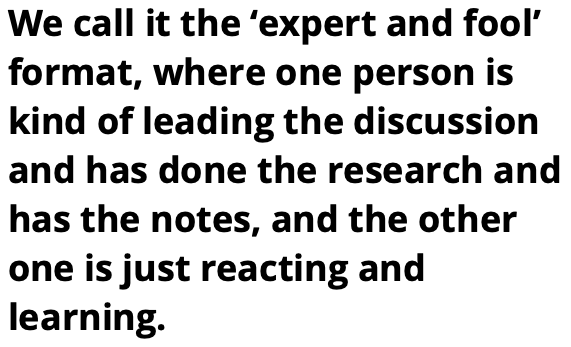
NW: Oh, it's very rare that both of us know the topic going in. We call it the ‘expert and fool’ format, where one person is kind of leading the discussion and has done the research, has the notes, and the other one is just reacting and learning. Sometimes we both know some things about it, like I recently did conspiracies about the Titanic, and of course some of those have been around a little bit. We don't both know what the topic is going to be going into it.
KB: Did you have any technical issues getting it started, like getting it launched, doing all that?
NW: It required a lot of Google searching. We use Libsyn for our hosting. Listening to other podcasts, people talking about things, I had heard that name bounced around, and I did some research. But early on, when we started, RSS feeds weren't as universal in terms of their formatting. There was a tool that I think is now defunct called Feedburner that I had to learn how to work with that kind of reformatted your RSS feed tagging to fit with more services. There were some hiccups getting on to the various platforms. This was before Spotify was quite as open. We just got on Spotify like a year and a half, two years ago. We had to go through some processes, have a backlog and have listeners before we could get on those places. But most of that has changed now. Libsyn can just push it everywhere and it's not a problem.
Yeah, there were some technical difficulties, I had to learn more about how things are tagged with ID3 tagging and Feedburner and RSS feeds than I really had intended.
KB: Those platforms have some varying requirements; do you create more than one master?
NW: Because we have a Patreon now, we put a bumper at the beginning of our show that gives the Patreon rundown, I end up bouncing multiple masters, with and without that bumper at the beginning. Or one gets sent to the Patreon feed and the other one gets sent to the main Libsyn feed. Giving the patrons that bumper every week just seems a bit annoying, so we try to make it as easy of a listening process as possible.
KB: And Patreon, that is working out well as a funder?
NW: Yeah, we do quite a few bonus things on there. It's been a lot of fun, we have a Discord that all of our patrons are in; we get to talk about whatever comes up on the Internet that day, conspiracies and just whatever, which has been a lot of fun. We recently started doing some Twitch streaming with patrons. It's been a nice way to reach out to the community and get some feedback on what kind of topics they like to hear about, whether things are working or not working. It also covers our hosting fees. We don't really make a lot extra or anything, but it covers hosting and some of the other fees; I bought a boom stand for my desk recently, those kinds of small things.
KB: What software do you record the podcast in?
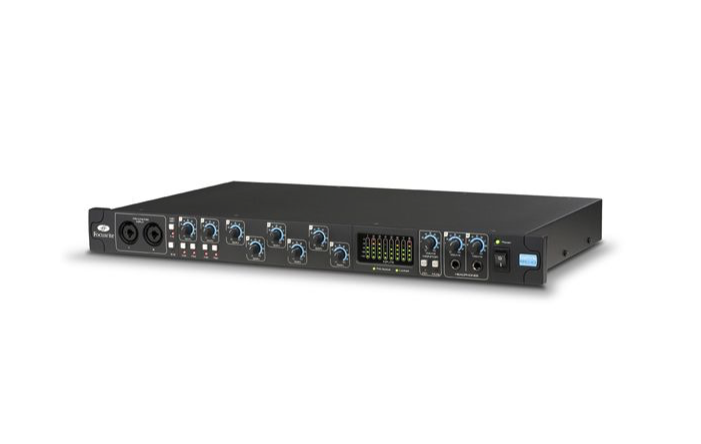
NW: Typically, historically, I've run it through Pro Tools, just because that's what I've had from my days in college. I have Pro Tools 11, I believe. I just have templates set up with all of my stuff. I have a Saffire Pro 40, so everything kind of goes in through there. I record it on separate audio channels with different, you know, plugin strips I've made over the years to manage my mic inputs. It all gets mixed down in Pro Tools and edited and everything and Pro Tools is really easy to do like edit marks in. But when we do remote recordings, I typically just use Audacity and mark them on a piece of paper in a notebook that I have.
KB: It’s kind of a live free-form conversation, so do you get real hairy with editing that and editing out the gulps now, whereas maybe you used to leave them in?
NW: I try to take out the big things. I don't think he would have a problem with me saying this, my cohost tends to do a lot of throat clearing, and I try to mark as many of those as I can. We've always been more of a conversational podcast; people have said they like that it feels like two friends just talking. So I don't edit for super-tight timing because there's a flow and a looseness that comes with the kind of podcast that we're doing. If there's any ever any super-long pauses, I trim them down. But it comes down to mainly just repeated flubs of thing or if someone sneezes or whatever. It's not a super tightly edited podcast. It's not like the pacing of a Marc Maron or an NPR-type podcast, right? But it's never intended to be.
KB: Do you guys use the same microphones? What microphones type to use?
NW: I have used a [Shure] SM7B through a Cloudlifter basically the entire time. That's what I'm on right now. That's what I use. But I don't have two of them. My roommate when he's here uses a [Shure] SM58 that I then run through various stuff. I've got some iZotope stuff. I use some various in-the-box mixing. Right now, since he's remote, my co-host uses a Blue Yeti.
KB: So a Yeti, that goes to a condenser, so you had to make a new channel strip for that, right?
NW: Yeah, I had to make new presets for my various things. He's in an office at his parent’s house, it's a little more roomy than I'm used to for what I record with him. I have to edit the compression settings and stuff to make it a little more tight. But he could use some [Auralex] ProMAX, frankly, where he's at right now.
KB: We'll have to take care of that. Hook Kyle up. But I didn’t notice that listening to some episodes today, so you’re doing great, getting rid of that room sound.
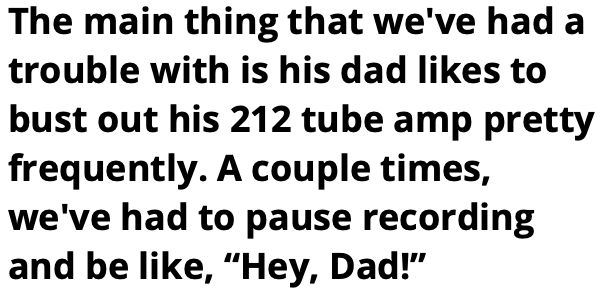
NW: Oh, that's good. Yeah, the main thing that we've had a trouble with, his dad likes to bust out his 212 tube amp pretty frequently. A couple times, we've had to like pause recording and be like, “Hey, Dad!”
KB: For the other dynamic mic to match your Cloudlifter, you're probably boosting up the mid-highs a little bit.
NW: Yeah, I've got some EQ boosting going on. I got [iZotope] Ozone a couple years ago. The sonic coloration options in there are pretty nice for making it a little more filled in at the high end. I use that in my settings as well to try to tie everything together.
KB: How many listeners do you have? How's that measured?
NW: Uh, so most of my stats are based on downloads per episode. We usually average around 8,000 downloads a month. It's been quite a while since we had fewer than 100 downloads in a day, multiple months, so that's been nice. There was a bit of a downtick at the beginning of quarantine. I think people were adjusting and doing other things for a little bit. I think we actually had our highest download month ever this last month, at about 8,300. Yeah, already 100 or so. That's through all of our different platforms. I think Libsyn started bringing together Spotify listens with your regular download count. The only thing that's not accounted for, we've recently started putting some backups on YouTube. I don't really know if there's a lot of traction there. Kyle does most of that.
We put together a sampler for a pod convention called Indie PodCon, that has a podcasting component that we submitted to early on. We were just about a year old and we found trying to cut bits out of our show is difficult because it is telling a either a story or a thing about an event throughout a whole episode. Unless you're cutting for just a specific joke, it's hard to cut just a portion out. So we thought about doing clips like that before, because there are podcasts that I listened to that have that, and I really like it. But it is a difficulty with our format to figure out what you would cut.
RW: Are there any other podcast convention things, or online things, that you've gone to or participated in?
NW: Not really, we almost went and tried to do some on-site stuff at an apocalypse preppers convention a little while ago, but we didn't have a mobile recording setup at the time. So that's something in my cards to try, it got pushed back a little bit to try to get like either lapels or a Zoom or something like that to have a little bit more mobile stuff, because we also really want to go and spend time or spend a night in like a haunted facility and do an episode in there. There’s an asylum down in Kentucky that we've looked at, along with some other haunted locations, maybe even like tag along with some ghost hunter, paranormal people. But what I realized none of this is conventions.
KB: So COVID-19 really doesn't change much for you if you already have a successful podcast - you can't play live, right?
NW: Yeah, it's not like we've gotten to the point where we're doing live shows or touring or anything. While I would love to do a live show eventually, that hasn't been in the cards yet. The only thing that really changed is my co-host being off-site. So we’re doing a lot more stuff over the internet, which we'd already had some practice at, from just various other times in the past that we've been traveling or whatever. So it didn't change a whole lot.
It's been kind of weird trying to address certain parts of it in the podcast just like from a point-of-view because we're not like a news podcast, but like there's a lot of stuff right now that is very relevant. We took our first ever week off during some of the protesting. It just didn't seem like the right time to be talking about conspiracy theories. But otherwise, no, it hasn't changed a whole lot it. We paused the Patreon for a little bit that one week, but otherwise it's effectively the same.
KB: Well, the next couple episodes after that, you're basically saying, we don't need the income, but there are plenty of groups that do and people that do that need help, so please go help them.
NW: Yeah, we put a new bumper on, it was kind of stuff we think is good to be aware of and causes we believe in. We also did an episode on COINTELPRO which is like weirdly relevant right now. So if you want the relevant conspiracy theory stuff, I guess that's the way to go right now. Yeah, that's otherwise it didn't change a whole lot.
KB: There is really no shortage [of conspiracies], right?Listening to your podcast, I've learned about so many I didn't know existed, or ones that I knew but didn't know they were as deep as they were, so many theories out there.
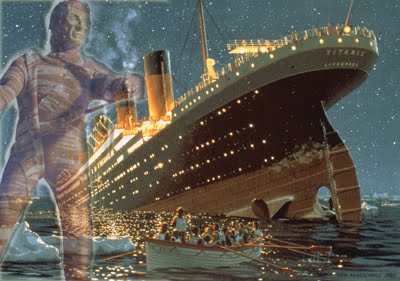
NW: There's so many facets. When I was looking at the Titanic thing, it turns out there are like three different main theories. And then also some people just think it was because of stuff that's completely… like a haunted Egyptian artifact. And also the one, that the number system on the vessel, it tied to an anti-Pope, anti-Catholic sentiment so that was like cursing it. Anytime you think you know a theory, there's also 16 other ones that are even wilder that you don't know about and that's been one of the joys of this podcast is being able to always have a wilder story.
KB: All those are wildly different than the bad rivets that couldn't sustain the hit of an iceberg.
NW: I do think one of the more plausible is basically they grab the wrong flares, so the flares they were using to try to alert a nearby boat were a color that was just almost like a…
KB: Hey, yeah, we’re just having a party!
NW: Exactly. They used wrong color flares and didn't use the distress flares. They use the party flares.
KB: Do you have any advice for anybody getting started, you know, like Robb and I?
NW: Burps aren't as funny as you think they are four years later. We were just talking to another podcast that's in our vein, called “Your Brain on Weird,” and they're like, ‘Oh, we're just debating whether or not we should edit those out.’ And I was like, ‘Yeah, just do it.’ Talking to you from four years in the future, just edit those out. It’s not nearly as funny later on when you're trying to like actually do this for real.
RW: That's a new filter in iZotope RX 8 is the de-burp/de-fart filter.
NW: If you could just run a filter over the whole file. that'd be great. Yeah, I'd love to do that's my old shows.
As far as advice, feel free to experiment with format. We've been looking at starting some bonus stuff. There's been a lot more work put into what format is this going to be what is like, do we want to have segments, do we not want to have segments, do we want to have just one big thing at the end… Play around with things. We've recorded various things that we got the end of it and decided it didn't really work. Don't be afraid to trash an audio file. Totally experiment around until you've got something you're happy with. Also, be sure to look up the name of your podcast before you start it and make sure there aren't other shows that have the same name. “It Might Get Weird” or something in that vein is a pretty popular comedian’s podcast, right? It took us quite some time to climb up those search results, even with our own name, because that was coming up pretty heavily early on. So you know, just check - podcasts are very easy to search now. There's so many providers out there, just do a quick look for your name before you get going and also on Twitter, because the name is pretty important; it needs to grab somebody right away. So, take some time and work on that. And if you're going to have a co-host, pick someone you really can stand to talk to a lot. I've seen a lot of podcasts implode because the co-hosts just couldn't deal with each other.
KB: Yeah, you know, I'm just wanting to talk about Robb a little bit…
RW: That does it! I'm out of here!
NW: Podcasting is a pretty easy art form. You just have a mic. Be ready to edit. And have something interesting to talk about. It's just those little back-end things that are more important to figure out and will help you in the long term.
RW: Did you try and analyze what you thought your demographic might be like as far as who you're trying to tailor this to, or that was not really a consideration at the time when you started? I was curious if you know what your demographic is?
NW: I don't have a super detailed breakdown. But starting out, I will say there was so little thought put into it, outside of ‘We want to record an episode and here we go.’ But once we got started, there was an early episode where we did an episode on the concept of sex magic, which is a Wiccan concept. And we got some feedback from a listener that had been listening to the rest of the episodes and said, “Hey, here's the thing, I am a pagan. Your episodes always feel like you are part of the group, that you're in on the joke, and you're hanging out and talking. This episode felt like you were out from the outside laughing at us.” That was a kind of a wake-up call that this is a thing that we want people to enjoy. A lot of things are kind of built into conspiracy theories, where things are either coded for or leaning into some stuff like racism, anti-Semitism, and that kind of stuff. Those are the things that you should be aware of and calling out.
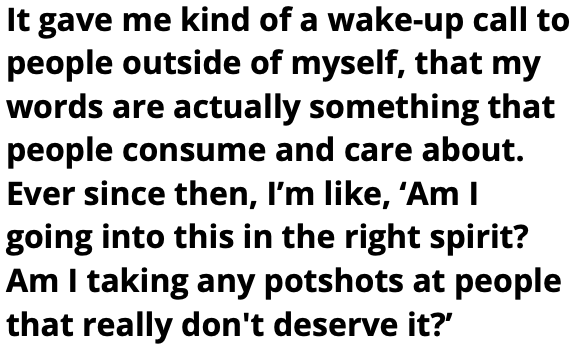
But a lot of the stuff that is more like in the paranormal fields, the spirituality side of this kind of stuff, it's just a different belief system. It's not hurting anybody. It's not causing anyone any problems. So don't treat it like a joke. You’re talking about a thing that people actually hold dear to themselves. It gave me kind of a wake-up call to people outside of myself, that my words are actually something that people consume and care about. Ever since then, I’m like, ‘Am I going into this in the right spirit? Am I taking any potshots at people that really don't deserve it?’ So that that's really the main thing in terms of a demographic or who it is for. We try to make it for people who are open-minded and ready for a fun time and not make it about attacking anybody.
KB: There are some really great episodes just about things, like Route 666 comes to mind. That's just a great episode.
NW: That one was a lot of fun. It happened due to the naming conventions of U.S. highways, and it accidentally caused some legitimate economic trauma to a part of the country. It's really wild.
KB: So it's a state road, the fingers off a main highway, right? So it has three numbers off Route 66. And it becomes Route six, six, six. But they changed the number, right? I don't want to spoil the episode. Listen to it.
NW: That was a lot of fun. I did the research on that episode. Some of the information I got was from forums for truckers. And people that are long-haul truck drivers talking about things they've either heard about, seen or dealt with, with the name change and everything. It's really interesting where you end up getting information for these episodes. It comes from all over. There’s a Cryptid Wiki. There are websites specifically trying to debunk conspiracy theories. By looking at their sources for where they're getting the things they're debunking, you can find the theories. The Internet is full of places that people talk about this stuff. Finding the interesting ways to get that information is always pretty satisfying. Or you just watch YouTube videos of like MS Sam voices talking about someone's Notes app. But it's pretty wild.
KB: Yeah, most of us would turn that off and find something else to watch on YouTube and you'll sit through it and take notes. “What kind of madness is going on here?”
NW: Yeah, the Flat Earth and the Hollow Earth [theories] were really fun for that, because it's a lot of people like with a fan on directly behind them angrily talking into a mic that is like way too loud and it's just very bad audio, but you got to listen to what you got to listen to.
KB: In each particular episode of your podcast, one person brings a topic and the other person doesn't know what it's going to be, you guys discuss, make jokes, get derailed, say crazy things. You culminate into one big question. We do that of sorts, certainly not as thought out and balanced or as interesting as a conspiracy theory, but we do ask one interesting or unexpected thing about you that you could share - hobbies, your interests, activities, something maybe off to the left from a podcast and conspiracy theories?
NW: Okay, so this is tangentially related to the podcast because I mentioned earlier that I've started one bonus show. I've gotten really into AEW, All Elite Wrestling, the company that started about a year, year and a half ago on TNT. We started doing a post-show for AEW each week. It's been a lot of fun having like an appointment thing to set on your calendar every week to watch and theorize on what's going to happen. I did not grow up on wrestling; I never really got into it. But for some reason, in the last year and a half, I have gotten really into AEW. A lot of the people come from other companies; either they are ex-WWE people or they come from Japanese circuits or indie circuits. I've gotten weirdly into wrestling over the past year. It's just been a lot of fun. I like long-form storytelling. I'm a big comic book fan. There’s a similarity there that I think is under-discussed.
RW: My son is 24 now and he's been a huge fan of WWE, but also all the other ones, since he was in junior high, I guess. And his main goal is to get a job writing for the WWE. He went to college to learn how to do script writing for that. That would be his dream job. He hasn't gotten there yet, but yeah.
NW: They could probably use it right now. I think there's a lot of discourse on their current trajectory, some people don't love it.
RW: Any other hobbies or interests?
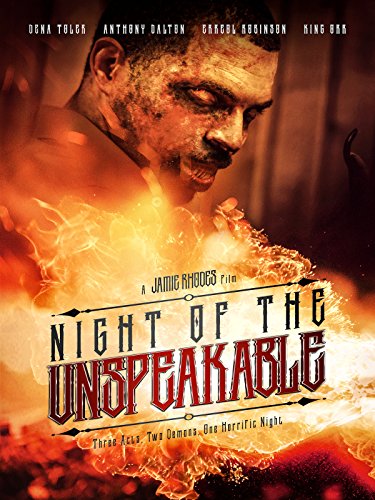
NW: This is probably not a huge feather in my cap, but there's a movie on Amazon Prime that I helped with sound a little bit. It was my first time ever doing a sound for [a movie]. It was an indie horror movie shot in a music studio in Indianapolis called “Night of the Unspeakable.” I have one of the few DVD copies of it. I got the last one that Amazon had. But I believe it's streaming on Amazon. It's not great. It's not good. But I got to work a couple friends. So yeah, I technically have an IMDB page with one credit. That was just a fun thing where I went to it directly from work every night for a week and didn't really sleep.
KB: There are other podcasts out there with weird names, but you should listen to “It Gets Weird” on all the popular podcasting platforms weekly for the main show, and there's variety content on Patreon. Niles is the host, along with co-host Kyle, his longtime friend. Any upcoming episodes you'd like to mention or a hint, a teaser?
NW: We just wrapped up a two-part episode on the historical Bavarian Illuminati. So if you want to know what the Illuminati is all about in reality, turns out – hint - it's not actually running the world. I'm about to do an episode on a thing called the Enfield Horror, which is an Illinois-based three-legged cryptid that terrorized a town back in the 1970s.
I’m in the middle of doing research for that one. I'm not fully up to date on it. But that's what's coming up and what's happening right now. By the time this comes out, they'll probably be some other episodes, but I'm sure it'll be fun.


